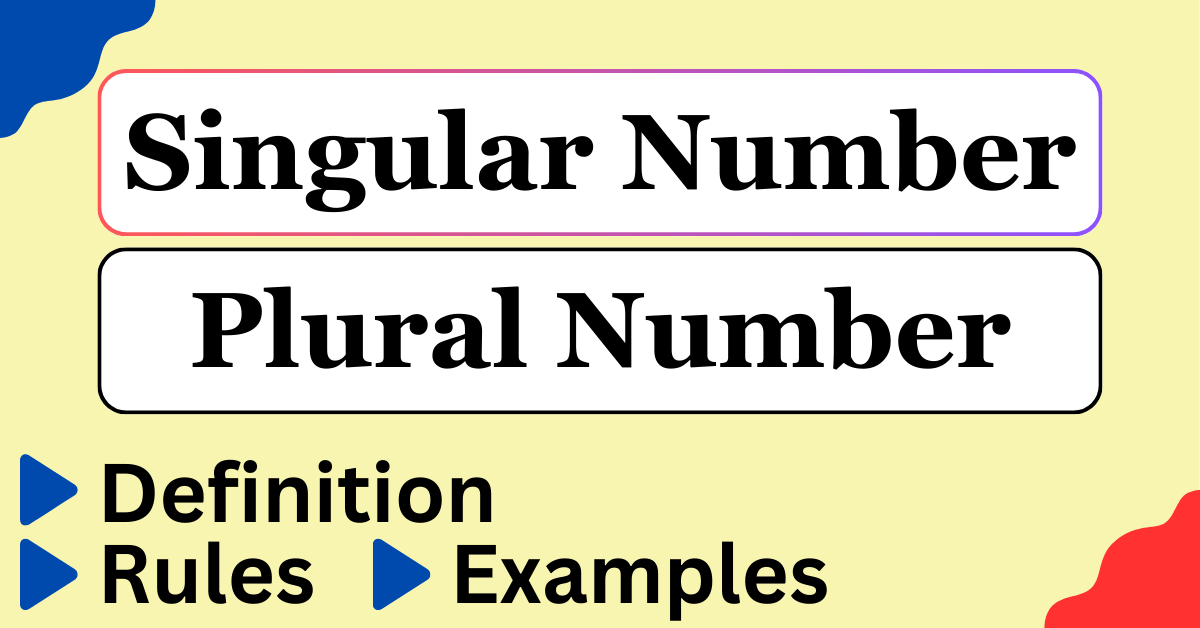Types of Number
There are two types of Numbers in English Grammar.
1. Singular Number
2. Plural Number
What is Singular Number ? Example
A singular number of a noun or pronoun is used to denote one person or thing.
For example,
Boy, Mango, Tree, Country, etc.
What is Plural Number ? Example
A plural number of a noun or pronoun is used to denote more than one person or thing.
For example,
Boys, Mangoes, Trees, Countries, etc.
How Plurals are formed: Singular Noun – Plural Noun
There are some rules to form plural Nouns from Singular Nouns.
Rule : 1
Generally, the plural form of a noun is formed by adding ‘s’ to the singular form.
For example,
| Singular Number | Plural Number |
| Book | Books |
| Boy | Boys |
| Pen | Pens |
| Table | Tables |
| Bird | Birds |
| Dog | Dogs |
| Cat | Cats |
| Chair | Chairs |
| Girl | Girls |
| Pencil | Pencils |
Rule : 2
Nouns ending in -s, -ss, -ch, -sh, and -x form their plural by adding -es to the singular form.
For example,
| Singular Number | Plural Number |
| Bus | Buses |
| Class | Classes |
| Bench | Benches |
| Watch | Watches |
| Brush | Brushes |
| Box | Boxes |
| Fox | Foxes |
When ‘ch‘ sounds like ‘k‘, the plural is formed by adding ‘s‘.
| Stomach | Stomachs |
| Monarch | Monarchs |
Though “Ox” ends with “-x“, the plural form of “Ox” is “Oxen“.
Rule : 3
Nouns that end with “-o” having a vowel before it, form their plural by adding “-s“
For example,
| Singular Number | Plural Number |
| Radio | Radios |
| Bamboo | Bamboos |
| Studio | Studios |
Rule : 4
Nouns that end with “-o” having a consonant before it, form their plural by adding “-es“
For example,
| Singular Number | Plural Number |
| Hero | Heroes |
| Mango | Mangoes |
| Potato | Potatoes |
| Mosquito | Mosquitoes |
| Buffalo | Buffaloes |
Exceptions :
| Singular Number | Plural Number |
| Photo | Photos |
| Piano | Pianos |
Rule : 5
If there are “double vowels” at the end of a noun, add ‘s‘ to make it plural.
For example,
| Singular Number | Plural Number |
| Tree | Trees |
| Bee | Bees |
| Radio | Radios |
| Zoo | Zoos |
Rule : 6
Nouns that end with “y” having a vowel before it, form their plural forms by adding “s“.
For example,
| Singular Number | Plural Number |
| Boy | Boys |
| Day | Days |
| Key | Keys |
| Toy | Toys |
| Monkey | Monkeys |
| Valley | Valleys |
Rule : 7
Noun ending in “y” having a consonant before it, forms the plural by removing “y“, then adding “ies“.
For example,
| Singular Number | Plural Number |
| Baby | Babies |
| Lady | Ladies |
| City | Cities |
| Country | Countries |
| Story | Stories |
| Family | Families |
| Body | Bodies |
Rule : 8
Nouns ending in “-f“, or “-fe“, form the plural by removing “-f“, or “-fe” and then adding “-ves“.
For example,
| Singular Number | Plural Number |
| Life | Lives |
| Knife | Knives |
| Calf | Calves |
| Half | Halves |
| Leaf | Leaves |
| Thief | Thieves |
| Wolf | Wolves |
| Shelf | Shelves |
Exceptions :
| Singular Number | Plural Number |
| Belief | Beliefs |
| Proof | Proofs |
| Roof | Roofs |
| Cliff | Cliffs |
| Safe | Safes |
| Chief | Chiefs |
| Gulf | Gulfs |
Rule : 9
Some nouns form their plural form by changing inside Vowel of the singular form.
For example,
| Singular Number | Plural Number |
| Tooth | Teeth |
| Goose | Geese |
| Foot | Feet |
| Man | Men |
| Woman | Women |
| Gentleman | Gentlemen |
Rule : 10
A few Nouns form their plural forms by changing the inside Vowel and the Consonant of the singular.
For example,
| Singular Number | Plural Number |
| Mouse | Mice |
| Louse | Lice |
Rule : 11
In Compound Nouns, we make their plural forms by adding ‘s‘ to the main word.
For example,
| Singular Number | Plural Number |
| Brother-in-law | Brothers-in-law |
| Daughter-in-law | Daughters-in-law |
| Passer-by | Passers-by |
| Sister-in-law | Sisters-in-law |
Rule : 12
Compound Nouns written without hyphen take ‘s‘ to form the plural.
For example,
| Singular Number | Plural Number |
| Bookcase | Bookcases |
| Armchair | Armchairs |
Rule : 13
There are some compound nouns that take double plural.
For example,
| Singular Number | Plural Number |
| Man-servant | Men-servants |
| Woman-servant | Women-servants |
Rule : 14
There are some Nouns that have singular and plural forms alike.
For example,
| Singular Number | Plural Number |
| Deer | Deer |
| Sheep | Sheep |
Rule – 15
A few Nouns form their Plural by adding ‘en’ to the Singular.
For example,
| Singular Number | Plural Number |
| Ox | Oxen |
| Child | Children |
Rule – 16
For abbreviations, we add an ‘s’ to the last letter of Singular.
For example,
| Singular Number | Plural Number |
| MP | MPs |
| VIP | VIPs |
Rule – 17
Some Latin words ending in “um” form their plurals by removing “um” and, then adding “a”.
For example,
| Singular Number | Plural Number |
| Datum | Data |
| Memorandum | Memoranda |
Exceptions :
| Singular Number | Plural Number |
| Asylum | Asylums |
| Museum | Museums |
Singular and Plural Number : Pronoun
There are some pronouns that have plural forms.
| Singular Number | Plural Number |
| I | We |
| He / She / It | They |
| You | You |
| This | These |
| That | Those |
| Me | Us |
| My | Our |
| Mine | Ours |
| Your | Your |
| Him / Her | Them |
| His / Her/ Its | Their |
| Myself | Ourselves |
| Yourself | Youselves |
| Himself / Herself | Themselves |
FAQs
Q1. What is the plural form of “Deer” ?
The plural form of “Deer” is “Deer”.
Q2. What is the plural form of “Ox” ?
The plural form of “Ox” is “Oxen”.
Q3. What is the plural form of “Sheep” ?
The plural form of “Sheep” is “Sheep”.
Q4. What is the plural form of “Leaf” ?
The plural form of “Leaf” is “Leaves”.
Q5. What is the plural form of “Goose” ?
The plural form of “Goose” is “Geese”.
Q6. What is the plural form of “Child” ?
The plural form of “Child” is “Children”.

